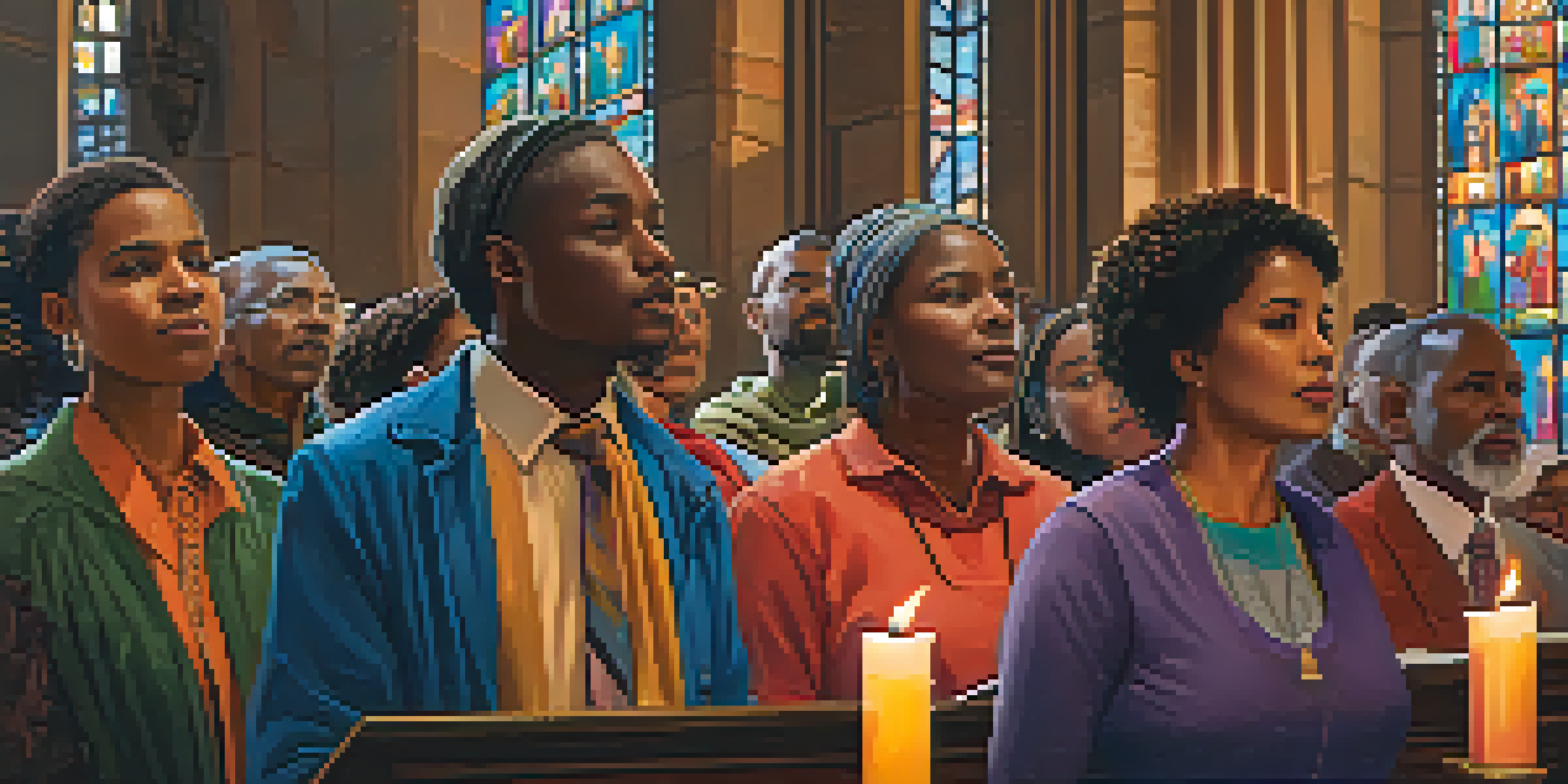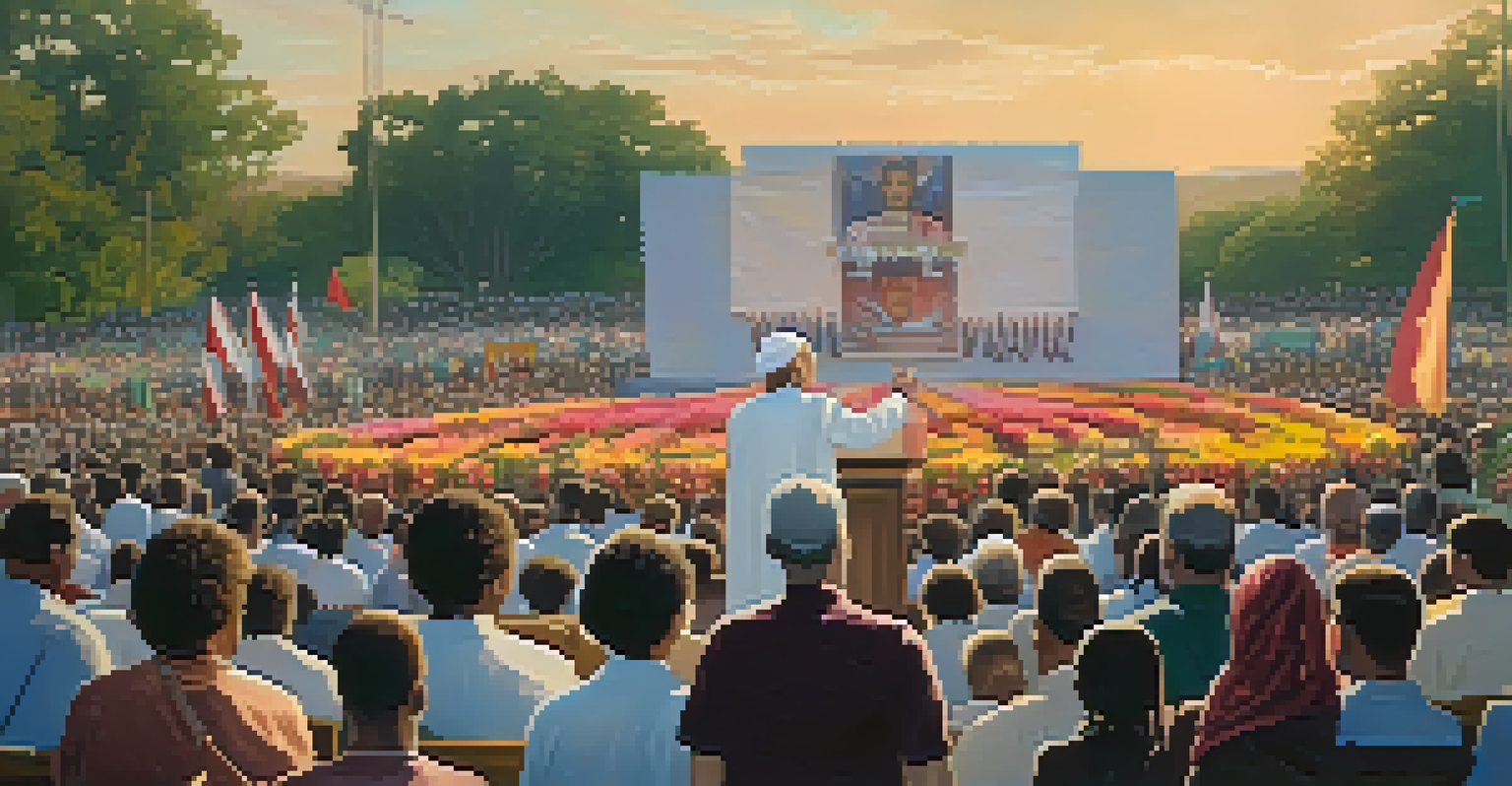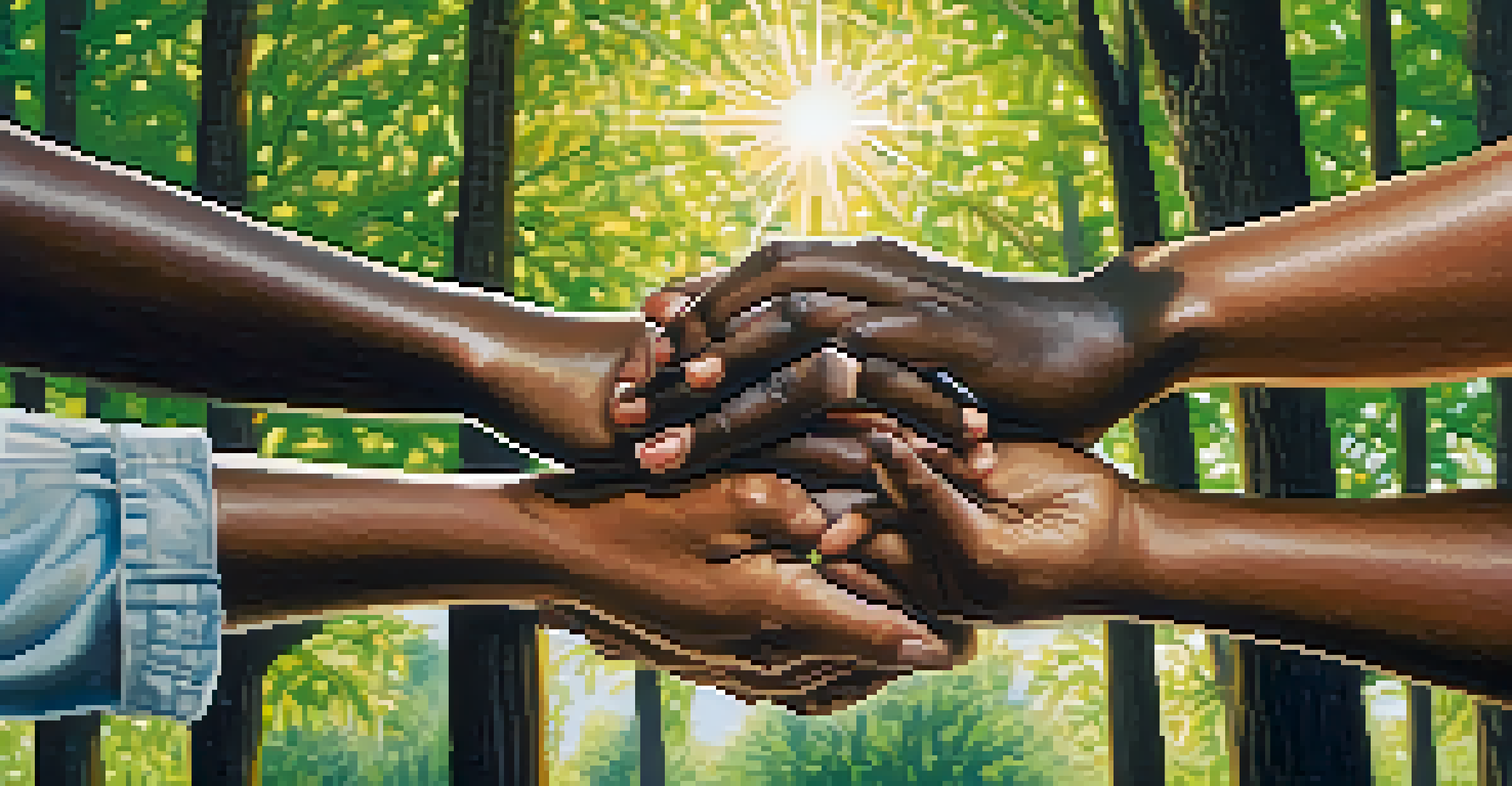Spirituality and Civil Rights: A Historical Perspective

The Intersection of Faith and Justice in History
Throughout history, spirituality has played a pivotal role in the fight for justice. Many civil rights leaders drew strength from their faith, believing in a higher moral authority that demanded equality and justice for all. This intersection of faith and activism often inspired communities to unite and take action against injustices.
Faith is taking the first step even when you don't see the whole staircase.
For instance, the abolitionist movement in the 19th century was heavily influenced by religious beliefs. Quakers and other faith groups saw slavery as a profound moral wrong, which fueled their efforts to end it. This early example highlights how spiritual conviction can serve as a catalyst for social change.
Moreover, the civil rights movement of the 1960s saw a resurgence of this dynamic. Leaders like Martin Luther King Jr. used Christian teachings to advocate for nonviolent resistance, framing the struggle for civil rights as not just a political issue but a moral imperative.
Spiritual Leaders: Voices of Change
Spiritual leaders have often emerged as powerful voices within civil rights movements. They not only provide moral guidance but also inspire collective action through their teachings. Figures such as Mahatma Gandhi, whose philosophy of nonviolence was rooted in spiritual principles, influenced many civil rights activists, including King.

These leaders emphasized the importance of love, forgiveness, and compassion in the face of oppression, which resonated deeply with their followers. Their spiritual messages helped to galvanize communities, fostering a sense of unity and purpose among those fighting for equality.
Faith Fuels Social Justice Movements
Throughout history, spirituality has inspired collective action and provided moral guidance in the fight for justice.
Additionally, religious gatherings often served as safe spaces for organizing and strategizing. Churches and temples became meeting points for activists, blending spiritual practice with activism, thus reinforcing the idea that the fight for justice was both a spiritual and social mission.
The Role of Religious Institutions in Civil Rights
Religious institutions have historically provided crucial support for civil rights efforts. They often mobilized resources, organized rallies, and offered sanctuary to activists facing persecution. Churches, synagogues, and mosques became beacons of hope and resilience during turbulent times.
Injustice anywhere is a threat to justice everywhere.
For example, during the civil rights movement, many African American churches served as hubs for organizing protests and community meetings. These institutions not only provided spiritual nourishment but also acted as a powerful platform for political activism.
The support from religious institutions was not limited to one faith; interfaith coalitions emerged to amplify the call for justice. This collaboration showcased how spirituality can transcend traditional boundaries, uniting diverse groups in a shared mission for civil rights.
Spirituality as a Source of Strength
In the face of oppression, spirituality has often provided individuals with a sense of resilience and hope. Many activists turn to prayer, meditation, or other spiritual practices to find strength during challenging times. This inner fortitude is crucial for sustaining long-term movements.
During the civil rights movement, participants frequently drew on spiritual songs and hymns to uplift their spirits. Songs like 'We Shall Overcome' became anthems of hope, reminding individuals of their shared purpose and the promise of justice. These practices not only empowered individuals but also fostered a sense of community.
Spiritual Leaders Unite Communities
Spiritual leaders have played a crucial role in civil rights movements by fostering unity and emphasizing values like love and compassion.
Furthermore, spirituality invites reflection on the moral implications of one’s actions. Activists often meditate on their motivations, reinforcing their commitment to nonviolence and justice, which is essential in maintaining ethical integrity throughout their struggle.
The Legacy of Spirituality in Modern Civil Rights
The legacy of spirituality in civil rights continues to resonate in today's movements. Contemporary activists often reference the teachings of past leaders, using them as a framework for current struggles against inequality and injustice. This historical continuity emphasizes the enduring power of spiritual conviction in advocacy.
Modern movements, like Black Lives Matter, have also embraced spiritual elements, incorporating rituals and memorials that honor those lost to violence and oppression. These practices serve as a reminder of the past and a call to action for the future, bridging generations in the quest for justice.
Moreover, the integration of spirituality into activism today often emphasizes inclusivity, reflecting a broader understanding of justice that encompasses various faiths and beliefs. This evolution showcases how spirituality remains a vital force in shaping the narrative of civil rights.
Challenges to Spirituality in Civil Rights Movements
While spirituality has played a significant role in civil rights, it has not been without challenges. The intersection of faith and activism can sometimes lead to conflicts, especially when differing beliefs within a community create divisions. Navigating these complexities requires careful dialogue and understanding.
Additionally, in the face of systemic oppression, some may question the efficacy of spiritual approaches compared to more direct political action. This tension can lead to debates about the best strategies for achieving justice, highlighting the need for a multifaceted approach that honors both spiritual and practical efforts.
Legacy of Spirituality Endures Today
Modern social justice movements continue to draw upon spiritual teachings, integrating them into their advocacy for equality and resilience.
Despite these challenges, many activists find ways to harmonize their spiritual beliefs with their advocacy. By fostering a culture of respect and collaboration, movements can draw strength from diverse perspectives, ultimately enriching the fight for civil rights.
Looking Forward: The Future of Spirituality in Activism
As we look to the future, the role of spirituality in civil rights activism remains vital. The ongoing struggles for social justice and equality will likely continue to draw upon spiritual underpinnings, offering hope and resilience in the face of adversity. This connection can inspire new generations of activists.
Emerging movements are increasingly recognizing the importance of mental and spiritual well-being alongside physical activism. Practices like mindfulness and collective healing are gaining traction, highlighting the need for a holistic approach to social justice that nurtures both body and spirit.

Ultimately, the legacy of spirituality in civil rights serves as a powerful reminder that the fight for justice is not just a political battle but also a deeply personal and spiritual journey. As activists move forward, they carry with them the wisdom of past struggles, guided by a commitment to uphold dignity, love, and equality for all.